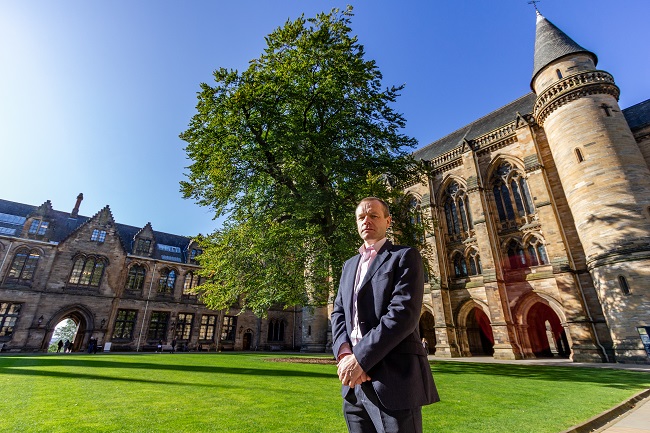What is MND
Find support
I have MND
I am supporting someone
Get involved
Research
About MND Scotland

There have been a number of research studies published in recent years that have reported an increased risk of elite football and rugby players developing neurodegenerative diseases, including MND. In 2022, Professor Stewart published a study suggesting that MND occurs more frequently in professional rugby players, compared to the general population, reflecting work he published in 2019, which found that professional football players had a three-and-a-half times higher risk of death from neurodegenerative diseases (such as Alzheimer’s, Parkinson’s and motor neuron disease) than would be expected.
It is not known what is responsible for this increased risk. We know that age, environment, lifestyle and genetics all play a role in determining whether someone will develop MND, and one risk factor that has been proposed is traumatic brain injury (TBI) as a result of repetitive head impacts such as those that may be experienced in elite-level contact sports.
This new project ‘Traumatic brain injury and motor neuron disease (T-MND)’ has been awarded £45,000 to interrogate almost 4 million existing electronic health records from the Clinical Practice Research Datalink, to better understand whether there is a relationship between TBI and MND. While this database has previously been used for studies into neurodegenerative conditions such as dementia, because it contains over 61 million health records, it is also a useful resource for looking at less common conditions, such as MND.
This work will be undertaken by Dr Xingxing Zhu, who is a postdoctoral researcher with Professor William Stewart and Dr Donald Lyall. Xingxing has a background in neuroscience and has recently completed a PhD at the Universities of Glasgow and Edinburgh, using population data to look at genetic contributions to brain and cognitive health, making her ideally placed to undertake this new project.
By identifying and understanding the risk factors for MND, clinicians and researchers may, in future, be able to establish strategies to reduce the risk of developing MND and ways to detect it at it earliest stages.
Dr Jane Haley, Director of Research for MND Scotland, said: “By coming together to co-fund this project, we aim to better understand whether there is a link between traumatic brain injuries, such as those that may occur in sport, and the development of MND.
“The three charities are also working together as part of the MND Scotland led ‘Sport and MND Expert Working Group’ which is bringing together international experts from many disciplines to look at what research is needed to better understand possible links between sport and MND.
“None of these activities would be possible without generous donations and we are very grateful to our supporters for everything they do to help fund vital research into MND.”
Dr Donald Lyall, Lecturer in Public Health at the University of Glasgow and project co-lead, said: “MND is a relatively uncommon condition, and this means that scientists need very large datasets to identify potential risk factors. Our project will use anonymized, secure large-scale healthcare data, from the UK population since 2005, to look for predictors of later MND. Our hope is that we can identify modifiable factors which may lower the risk of this condition. We are very grateful to MND Scotland, the MND Association and My Name’5 Doddie Foundation for this opportunity and look forward to sharing our results.”
Join us on the journey to a cure and help to fund more pioneering research by donating here. For more ways to get involved and support MND Scotland, please us visit here.
Sign up
for newsletter
Get the latest news and events straight to your inbox
You can help create a world without MND